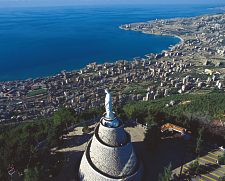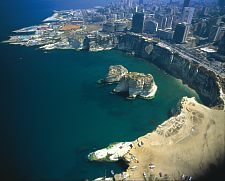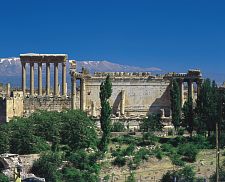|





| |
Man with a three-track mind
By Zvi Bar'el
Haaretz, August 12, 2006
 In
dealing with Hezbollah, his people and the world, Siniora has surprised
everyone. In
dealing with Hezbollah, his people and the world, Siniora has surprised
everyone.
When Israel's ambassador to the United Nations Dan Gillerman invoked the name
of Hiram, king of Tyre, to prove that Israel and Lebanon used to enjoy good
neighborly relations, the beginning of a smile appeared on the face of Dr. Tarek
Mitri, the Lebanese special envoy. The Greek Orthodox Mitri, who acts in normal
days as Lebanon's minister of culture, can't be caught off-guard with historic
tales of Lebanon.
Mitri has a bachelor's degree in chemistry from the American University of
Beirut, and a master's in philosophy and a doctorate in social sciences from the
University of Paris. He studies the Phoenician past of Lebanon as a hobby, and
has promoted the inclusion of archaeological sites in the country as part of the
UNESCO World Heritage conservation program. Thus, in his response at the UN,
Mitri had no need to consult any history books when telling Gillerman that
"Hiram the king was a builder - you only destroy."
But rhetorics were not the most important aspect of this meeting. The real
question was, what was Mitri doing at the UN in the first place? Why wasn't
Lebanese Foreign Minister Fawzi Salloukh there?
The answer is that Prime Minister Fouad Siniora decided not to send the minister
because he does not trust him. When Siniora put together his government last
year, the question of who would be the foreign minister came up. Hassan
Nasrallah and Parliament Speaker Nabih Beri wanted him to be one of their own.
Siniora wanted another man, a confidant, but when confronting the power
struggles and the need to maintain a balance in the government - as well as the
threat by Nasrallah and Beri to boycott and prevent approval of the government
in the parliament - he agreed to appoint an "independent Shi'ite," one with no
ties to any organizations.
The choice was Salloukh, who soon turned out to belong to a very specific
"camp." In March this year, with the Arab summit conference in Khartoum then
approaching, controversy arose over who would represent Lebanon there: the
president or the prime minister. To avoid a crisis the organizers decided that
the event would include participants at the level of "leaders and heads of
state," thus allowing both Siniora and President Emil Lahoud to participate. The
conference was of great importance for Lebanon, since it was the first time that
the government's - and particularly Siniora's - position on the status of
Hezbollah was to be presented.
Siniora agreed with Salloukh that the Lebanese proposal that was to be made
should include the country's demand to regain control over the Shaba Farms, "in
accordance to UN Security Council Resolution 425 from 1978." However, behind his
back, Salloukh and Syrian Foreign Minister Walid Moallem agreed on another
version, according to which "the Arab League supports Lebanon's efforts to
liberate the Shaba Farms ... and this using all legal means, including the
drawing of the borders as part of the bonds of brotherhood between Syria and
Lebanon, while emphasizing that the Lebanese resistance [i.e., Hezbollah - Z.B.]
is a true and natural expression of the Lebanese people's right to liberate
their lands."
Siniora heard of this version of the conference decision for the first time upon
arriving to Khartoum, and only after sitting with Syrian President Bashar Assad,
who failed to update him on this matter. Siniora was enraged, but in order to
prevent greater embarrassment, he proposed his own version, which mentioned the
resistance but left out Moallem's and Salloukh's superlatives. Syria was very
satisfied, but Salloukh realized that his status as foreign minister had been
damaged.
This incident testifies to the set of pressures and problems that Siniora also
faces in normal times, when there is no war and no difficult decisions to be
made.
"It is a government that reminds one of an octopus," a Lebanese reporter
commented this week. "Everyone seems to always be dressed up for a feast, but it
is a feast of carnage. Every tentacle operates in a different direction, any
pair of them can form a coalition against another four tentacles, and you can't
always tell where the head is."
Numbers and finance
This portrayal, together with the goings-on in Khartoum, actually testifies to
Siniora's skills. He is a man of numbers and finance, who ran Rafik Hariri's
business empire before becoming prime minister and served as a finance minister
as well. Since the war erupted, Siniora is running his government on three
tracks: He deals with Hezbollah through Beri, with the Lebanese public through
Information Minister Ghazi Aridi, and with the world through Hariri's son, Saad
Hariri, who spent the last week in France.
In all three tracks this man, who broke down during the conference of Arab
foreign ministers in Beirut this week, has managed to surprise everyone. His
decision regarding stationing Lebanese army reserve soldiers to prove that his
intentions are genuine, was a perfect move in negotiations. The story began when
Siniora received the French-American proposal for a cease-fire, and understood
that even if he could live with it, he would have a problem with Beri and
Nasrallah, without whose support the war will continue.
Therefore, it was necessary to revise the proposal. A phone conversation with
U.S. Secretary of State Condoleezza Rice and the press conference she held
earlier this week made it clear to Siniora that there was no chance of such a
revision. Perhaps a "normal" politician would have thrown in the towel at this
point, but not Siniora, who has on many an occasions seen the rise and fall of
business deals over the way negotiations were handled.
Together with Hariri Jr., he decided that a new element had to be introduced
into the equation. It's not exactly clear who proposed deployment of the
Lebanese army, Siniora or Hariri, but ultimately the latter suggested to test
the idea on the French, and if it would be well received, and there would be a
willingness for flexibility, Siniora should present it to his partners in
government.
France approved, and even relished the idea. "Will Nasrallah accept?" the French
asked Hariri. At the time Hariri could only answer on principle. Nasrallah and
Beri would not be able to object to this idea, since it is rooted in the 1989
Taif Agreement. In other words, Nasrallah need not "surrender" to UN Resolution
1559, nor to the 1949 truce signed between Israel and Lebanon.
With these arguments in hand Siniora faced Beri, who understood that he would be
unable to object to the proposal - not only because of its legal arguments, but
also since it might represent a one-time opportunity to prevent the deployment
of a powerful multinational force in Lebanon, and to leave the bulk of work in
the south to a Lebanese force over which he wields considerable influence. This
leaves Nasrallah, who is still to publicize his version of how the proposal was
presented to him, and what convinced him to accept it.
Siniora now had an answer ready for the French, only in the meantime he had to
host the Arab foreign ministers who had assembled in support of Lebanon. Again
Siniora proved his mastery of negotiation. Two weeks ago in the Arab League's
emergency conference in Cairo, the league's secretary general, Amr Musa,
announced the bankruptcy of the organization and of the regional peace process.
Siniora used the Arab League as leverage, and the tears that choked him were
well timed. While pushing Syrian Foreign Minister Moallem into the opposition
corner in the process, Siniora managed to convince the other ministers to send a
respectable team to New York to display a tough but practical Arab position. No
longer was there the familiar whining, but a concrete proposal. And Siniora,
with his knowledge of negotiations, knows that when he is being asked about the
make-up of the Lebanese army that will descend into the reaches of southern
Lebanon, the deal is done.
--------------------------------------------------
For speeches given before the
UNSC, click here.
|